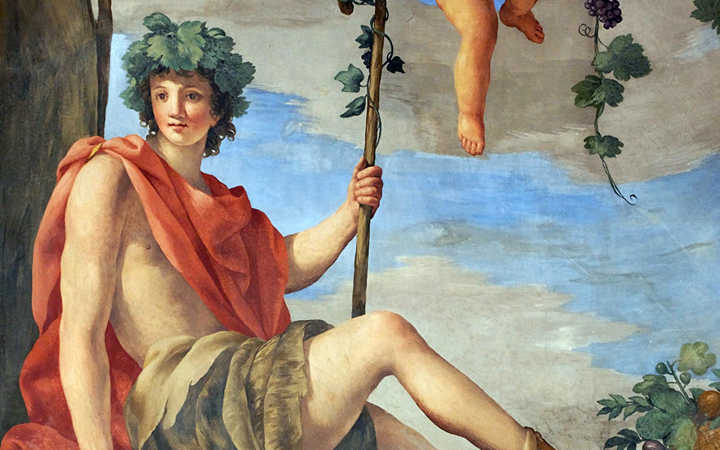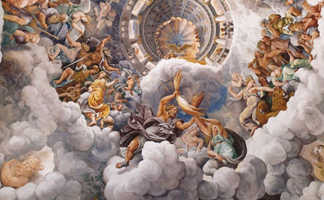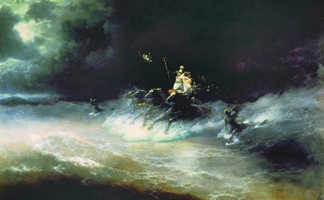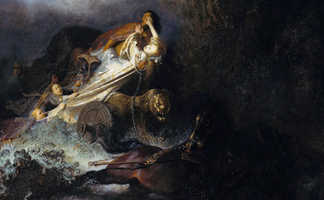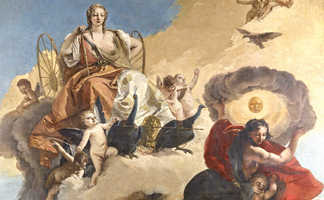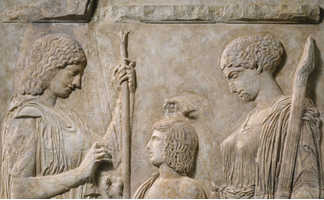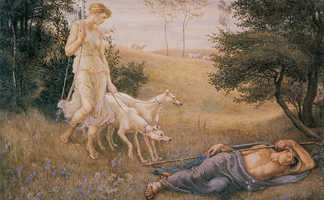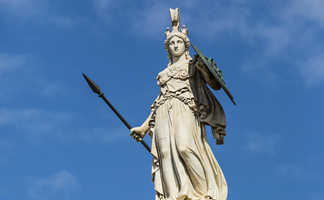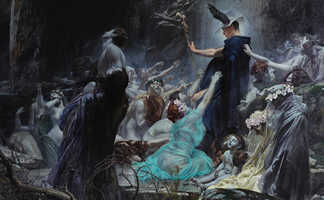Dionysus, along with Demeter, were considered the two great gods of the earth. While Demeter was ruler of the harvest and agriculture, Dionysus specialized in the vintner’s art, and the orgiastic celebrations that accompanied his worship live on today in various Bacchanalian celebrations the world over, such as Mardi Gras in New Orleans and other carnival holidays held in the Christian world in the pre-Lenten late winter. The Eleusinian Mysteries, the other great feast on the ancient Greek calendar, died out because of their secretive nature.
His Story
Dionysus was the offspring of Zeus and Semele, a princess of Thebes. He was the only deity who was born of mixed mortal and divine blood. The Father of History, Herodotus (484-425 BC) claimed that Semele lived around 2,000 BC. As with many origin stories, there are different versions of the seduction of Semele by Zeus, but the most common one seems to have Semele as a priestess of Zeus, who caught Zeus’ eye as she was slaughtering a bull at his alter. While washing the blood of the bull off herself in the river Asopus, Zeus flew over her, disguised as an eagle. Zeus seduced her. Repeatedly.
Theirs was a love match, as Zeus and Semele seemed to really care for each other. But Semele paid a terrible price for her affection. Hera, Zeus’ permanently jealous wife, planted in Semele the desire to see Zeus in his full splendor as King of Heaven. Semele then manipulated Zeus into granting her a wish, which he agreed to. He sealed the promise with an oath, swearing by the river Styx. This made the oath irrevocable. At this time, Semele had come nearly full term with their baby. When she requested that Zeus reveal his full glory to her, he did so with the utmost reluctance, and would have refused her, had he not taken the oath. He knew that Semele would die if she, a mortal, saw him this way. And that’s what happened. She died instantly in the blazing fire of Zeus’s glory.
However, before she died, Zeus snatched the baby from her womb, saving it. He hid it in his own side until the baby was born. It sounds a little strange for a male to give birth to a child, but don’t forget that Zeus “birthed” Athena, fully armored, from his forehead.
After that, Zeus had Hermes deliver the baby to Nysa, the most beautiful valley in the world, with a location no one has figured out. There the baby was raised by the nymphs of Nysa, which some traditions claim were afterwards placed in the sky by Zeus. This cluster of stars, called the Hyades, can be found in the midst of the constellation Taurus. When the Hyades are close to the horizon, they are said to bring rain to the earth.
“So,” as Edith Hamilton says in her classic book Mythology, “the God of the vine was born of fire and nursed by rain, the hard burning heat that ripens the grapes and the water that keeps the plant alive.”
The Wanderer
When he grew up, Dionysus wandered the earth. His travels took him, as one ancient poet writes, to
The lands of Lydia rich in gold,
Of Phrygia too; the sun-struck plains
Of Persia; the great walls of Bactria.
The storm-swept country of the Medes;
And Araby the Blest.
Wherever he went, he taught men how to cultivate the vine, and how to worship him. He was accepted wherever he went. As he approached his homeland by ship, he was kidnapped by pirates, who paid for their mistake by being turned into dolphins by the god. When he passed through Thrace, in northern Greece, he was insulted by Lycurgus, a local king, who opposed the worship of this new god. Dionysus punished him by imprisoning him until he understood who Dionysus was. Zeus, who was less kindly than Dionysus, eventually struck the king blind, and he died soon thereafter.
While stopping at the island of Naxos, Dionysus found Ariadne, princess of Crete. She had helped the hero Theseus escape from the Minotaur, and he had shown his gratitude by abandoning her at Naxos. (Maybe she was too clingy.) He rescued her, loved her, and at her death he placed a crown he had given her among the stars in the sky. It is now a constellation known as the “corona borealis (northern crown).”
Dionysus also rescued his mother from the underworld, and gave her a place to live in Olympus. She was the only mortal to live there, but, considering that she was the mother of a god, she was given a pass.
His Dual Nature
Dionysus had a dual nature. He, or rather, the wine he gave to man, could give ecstatic joy, freedom, and the removal of inhibition, or he could give unspeakable cruelty and drive men to commit awful, violent crimes. The Old Testament says that wine “cheers God and men,” and that it “makes man’s heart glad,” whereas elsewhere it warns that “wine is a mocker, strong drink is a brawler.” And it’s common for people to be described as either a “happy drunk” or a “mean drunk.”
The Fall of Cousin Pentheus
So Dionysus could give either joy or cruelty, happiness or destruction. The worst case of the latter can be found in the city of Dionysus’ mother, Thebes. He came to that city to establish a place of worship. Pentheus, the king of Thebes, was also Dionysus’ first cousin, being the son of Semele’s sister. He was unaware that Zeus had saved Dionysus when Semele had died.
Dionysus, as was his custom, came to the city followed by a train of women dancing and singing wildly, encouraging the Thebans to “joyfully praise him, him who brings joy.” Pentheus was not impressed. He called for an instant cessation of all the racket, and ordered the revelers to be seized. Special attention was given to their leader, whose face was described as being “flush with wine.”
Pentheus, however, had been warned by the blind prophet Teiresias that Dionysus was a new god, greatest, in the earth, along with Demeter, and, as a matter of fact, Teiresias’ own cousin. Teiresias mocked the prophet, and had Dionysus arrested brought before him. Teiresias spoke abusively to Dionysus, who answered quietly and gently, as if he was trying to convince the king of his divinity. Teiresias remained consumed with hatred, especially when Dionysus assured him that god had seen Dionysus’ suffering and would deliver him.
“God? What God?” Teiresias said. “I don’t see any god.”
“That’s because you are not pure,” Dionysus replied.
The king ordered him bound and taken to prison, which could not hold him. He escaped and went to Teiresias once more, imploring him to see that he was divine. Teiresias, still unconvinced, heaped insults upon him and went to his chambers. He eventually met his end by being torn to pieces by Dionysus’ female followers, whom he had made mad to the degree that they thought the king was a wild beast, once again illustrating the dual nature of wine, and the god of wine.
Above all, ancient Greeks were a realistic and practical people, who saw both the benefits and the negatives of wine drinking. The accepted both sides of the coin: that wine made the heart merry, but also made the heart black with rage.
The Dionysia
The great festival of Dionysus, the Dionysia, was held every spring, just as the vine would send forth its new leaves. The celebration lasted five days. All activity in Athens would cease, no one could get arrested, and even those who were imprisoned were set free for the celebration. The focal point of the celebration was neither temple, glade, forest or vineyard. It was the theater. Instead of a religious ceremony, plays were put on.
Some of Greece’s greatest plays and poems were written in honor of Dionysus. Poets, playwrights, actors- all considered themselves servants of the god of the vine. As implied, the plays were more than storytelling, they were the festival’s religious ceremonies. Dionysus himself was said to be present. The idea was that Dionysus inspired the creative work of these writers. There tragedies and comedies, but the preponderance were tragedies, and those that survive are still being performed. They have never been rivaled for their sheer dramatic power, with perhaps the exception of the plays of William Shakespeare, many of which have Greek-derived themes.
The Suffering God
The reason for there being more tragedies was that Dionysus was also considered a suffering god. Grape vines were severely pruned in the autumn, leaving only the bare stock, which looked dead throughout the winter. If you drive by a vineyard in Attica in the winter you’ll see rows and rows of what looks like dead, naked little trees just a couple feet tall and spaced a few feet apart. Most Greek vineyards are like this- short, free-standing plants, and not the trellises you see in Western Europe and elsewhere. In the same fashion that Persephone died with the coming of cold weather, so did Dionysus, as personified by the vine. But he always came back to life in the spring. It was this resurrection that was celebrated during the Dionysia.
The Dionysian tragedies were often full of graphic, brutally violent imagery. These plays revealed the dark side of Dionysus, and of human nature. For a brief time, during the festival the veneer of civilization was ripped away, and the cruel, animalistic side of human nature was exposed, as well as the sexual mores that were for the most part held in check during the rest of the year.
Life After Death
But there’s more. Dionysus also embodied the assurance that there was life after death, that the soul is eternal. This was what the Eleusian Mysteries were all about as well. This is another reason why Dionysus, the other great god of the earth, took his place besides Demeter during the Mysteries.
The writer Plutarch, in 80 AD, while away from home, received news of the death of his daughter. A follower of Dionysus, he wrote his wife to comfort her. “We hold it firmly,” he wrote, “for an undoubted truth that our soul is incorruptible and immortal. We are to think of the dead that they pass into a better place and a happier condition. Let us behave ourselves accordingly, outwardly ordering our lives, while within all should be purer, wiser, incorruptible."
Thus Dionysus. He is sometimes called the “thirteenth god,” desiring a home in Olympus, augmenting the twelve god pantheon by one. In English, we refer to heavy partying during certain holidays with the word Bacchanalia, which of course is derived from the Roman name for Dionysus, Bacchus. Dionysus reminds us that life, and wine, can give one exuberant joy, such as that exhibited by Alexis Zorbas in Zorba the Greek. But we must never forget the negatives of excess, which is why the wiser ancients strove for moderation in all things.
